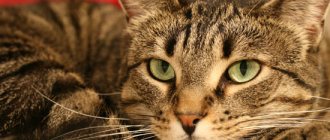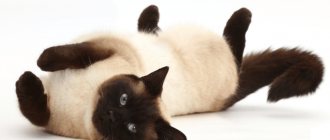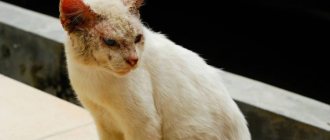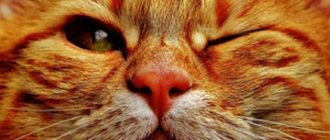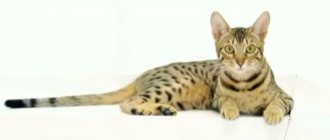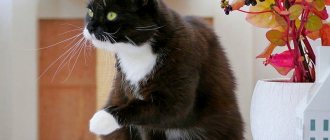Age: any
Symptoms: change in behavior, atypical aggression, refusal to eat, refusal of the animal to care for itself, reluctance to make contact, and others
We are accustomed to the fact that depression is a problem for people, but it turns out that our pets, in particular cats, can also suffer from this disease. Veterinary medicine encounters depression in cats quite often, although not all owners are aware of this problem. So what is it - depression in a cat ?
The animal strongly waves its tail
A cat's depression quickly shows in its behavior - just look at its tail. In a happy animal it moves gently and carefully, but in a depressed animal it twitches sharply and strongly. Try to monitor the animal to determine the source of the discomfort. Cats quickly develop certain habits and don't like change, so think about what might have changed recently. Perhaps this will help.
Serious reasons why a cat eats poorly and sleeps a lot and is lethargic
The dog is lethargic, refuses to eat and lies all the time
However, such a condition may also indicate a serious illness.
Worms
Associated symptoms:
- depressed state for several days;
- a sharp decrease in appetite or its complete absence;
- weight loss;
- disturbances in the functioning of the gastrointestinal tract (constipation, diarrhea, vomiting, flatulence, rumbling);
A swollen belly in kittens may be due to worms
- the coat is dull and crawling;
- swollen, barrel-shaped belly;
- dry crusts in the corners of the eyes without signs of inflammation;
- detection of traces of blood, fragments or whole worms in feces.
Important! If this disease is detected, your pet should be given an anthelmintic drug, the dosage of which is calculated according to the instructions.
Ticks
The bite of this external parasite can provoke piroplasmosis, the causative agent of which, entering the blood along with the saliva of the tick, spreads through the circulatory system in a matter of days and colonizes red blood cells. Its main goal is to weaken the immune system and disrupt the functioning of internal organs. If left untreated, such a bite can be fatal for the cat.
A burrowing tick can spread infection
If the cat is lethargic, sleeps all the time and eats little, has loose stools, vomiting, red urine and fever, you need to urgently examine it for a tick. The detected parasite must be removed, it is better if this is done by a doctor, because along with the tick’s saliva, the poisons and infection contained in it enter the cat’s body. But it is not always possible to quickly go to the clinic. In this case, you will have to remove the tick yourself using tweezers, a thin strong thread or another tool that can tightly grasp the body of the parasite. It is important to grab the bloodsucker as close to the cat's skin as possible and then carefully twist it clockwise.
For your information! A sharp jerk can tear off the body of the tick, and the head, remaining under the skin, will continue to spread the infection. Sometimes, when extracted, small head parts of the parasite remain under the skin, this is not scary, the cat’s immune system can handle it.
After removal, it is recommended to place the tick in a glass jar with alcohol or vodka; in such an environment, the tenacious parasite will die. And if you suspect infection with encephalitis or Lyme, you must deliver the parasite preserved in alcohol to the clinic for examination.
Poisoning
The cat does not eat well and sleeps constantly in case of poisoning, the causes of which may be stale food, household chemicals, medications, rodent poisons or secreted by house plants, etc. Frequent companions are severe chills, difficulty noisy breathing, lack of appetite, digestive tract upset (diarrhea, vomiting), increased salivation. In addition, there is a change in the color of the mucous membranes (reddened, blue or pale) and an increase/decrease in body temperature.
After poisoning, a cat lies a lot and moves little
Intestinal obstruction
This occurs due to the ingestion of small objects, the inability to regurgitate a large hairball, helminthic infestations, volvulus, or the consequences of gastrointestinal diseases.
Note! Owners often confuse obstruction with constipation, trying to eliminate the problem with a laxative, which causes greater damage to the pet’s health.
Pronounced symptoms of obstruction:
- a lethargic and apathetic state, a desire to hide from people and animals, in some cases loud meowing, obsessive following of the owner and attempts to pay attention to the stomach;
- a gradual decrease in appetite until a complete refusal to eat, food intake is accompanied by subsequent vomiting;
- prolonged absence of feces in the tray;
- aggression when trying to touch a swollen abdomen;
- Trying to get rid of gas, the cat rolls on the floor and carefully licks its stomach.
The cat is rolling on the floor due to intestinal obstruction
Asthma
With such a disease, the cat quickly gets tired and does not have the strength to play its usual games. She breathes with difficulty, often and shallowly, whistling sounds emerge in her breathing. The usual posture for an asthmatic is a hunched back, with the neck very elongated in a sitting position. As the disease progresses, apathy and drowsiness increase. If you notice the first signs, you should urgently visit a veterinarian.
You can't help but notice your cat's asthma by its noisy breathing.
Urolithiasis
The first symptom of such a disease is frequent, prolonged and painful urination in the wrong place, which at first the owner may mistake for the pet’s misconduct. The painfulness of the process and resentment for undeserved punishment provoke a change in behavior - the cat becomes sad, phlegmatic and drooping.
As the disease progresses, the pet runs to the toilet more and more often, in most cases not reaching the litter tray, since it can no longer restrain the urge, rapidly loses weight, and more and more blood enters the urine. If you notice an increase in urination and traces of blood in the urine, you should urgently seek help from a veterinarian to prevent the development of an advanced form of the disease and the manifestation of severe symptoms.
Urination posture for urolithiasis
The cat suddenly became very demanding
Cats are known for their independence and mood swings, however, each has its own character. Watch for sudden changes. Many pet owners love it when cats curl up on their laps or jump on their bed in the morning. If this suddenly changes and the animal becomes overly capricious, pay attention to this. Your pet may be depressed.
Floor for €10 million: the gladiator arena will be restored in the Colosseum
Druid flower horoscope for 2021 by date of birth
It's all for real: TikTok star Valya Karnival is dating Yegor Creed
Treatment of stress in cats
To bring a cat out of stress, a set of measures is needed. It includes psychological assistance from the owner and medications. Most often, non-hormonal sedatives for stress are used in therapy. But first of all, it is necessary to identify the cause and, if possible, remove or reduce the impact of the stressor.
Psychological and behavioral therapy
The technique consists of increasing attention to the pet and using games. Animal psychologists recommend using the distraction method. The owner’s task is to switch the cat’s attention from the object of stress to the toy. It is most convenient in such a situation to use interactive moving objects.
Another technique is immersion, which is considered more difficult. Real stress conditions are created for the pet, but the situation is kept under control. This switch helps level out the symptoms of the previous disorder. But this method requires great care and scrupulousness on the part of the person, otherwise the animal’s condition can only worsen.
Training helps relieve stress. The artificial creation of obstacles and difficulties that need to be overcome physically forces the cat to mobilize its strength. If it is impossible to eliminate the cause of stress (for example, canceling a move), it is worth surrounding your pet with care and affection. Frequent stroking, talking to your pet, and offering your favorite treats help you get through the adaptation period faster.
Medication assistance
global $ads_google; //data-ad-slot=”2475549904″ $ads_google = empty($ads_google) ? false : true; ?> if ($ads_google == false) {?>
$ads_google = true; ?> } ?>
The modern range of medications used for neuroses in cats includes sedatives, vitamins, and preparations with pheromones. They are available in the form of drops, aerosols, and tablets. In pet stores you can find special collars with anti-stress impregnation.
The following have antidepressant effect:
- Bach flowers
. A set of homeopathic plant extracts with different effects. To relieve stress, essences from agrimony, aspen, clematis, poultry and other plants are recommended.
- Stop stress
. The sedative contains phenibut and extracts of peony, skullcap, motherwort, mint, hops, and valerian. Biologically active substances normalize brain functions.
- Cat Baiyun
. A natural remedy for stress from medicinal plants: mint, valerian, sweet clover, oregano, thyme, lemon balm. Available in tablet and liquid form.
- B vitamins
. They improve the conduction of nerve impulses and help normalize the psychosomatic state. Vitamins do not cure, but provide good support for anti-stress medications.
At home, it is easy to prepare herbal infusions and decoctions from soothing herbs (oregano, mint, lemon balm). Essential oils of plants are used as fragrances for the room in which the cat is located. The esters of lavender, neroli, mint, and bergamot have the best effect.
It is advisable to consult a veterinarian before starting treatment for stress with medications.
An animal scratches your hands
Almost all cats show displeasure from time to time by scratching the owner's hand. If your pet starts showing his claws, you immediately know that he is irritated and unhappy. This does not mean that the animal has chronic depression, it just doesn’t like something. Perhaps something is ruining his mood. Don't get angry with your pet, try to calm him down. Nothing will improve a cat's condition more than communication with its owner.
Chronic stress
A constant or periodically occurring stress factor puts a cat in a state of chronic tension. The animal's behavior changes and there are signs of physiological disorders. The pet tries to hide in a secluded place where no one can disturb it. Solitude is accompanied by increased drowsiness, weakness, and reluctance to play or show any activity. At the same time, a cat may react inadequately and even aggressively to loud unexpected sounds.
Bouts of gluttony or, conversely, ignoring food also indicate an ongoing chronic process. Cats often begin to mark the house, defiantly leaving puddles in different rooms or even near the bowl. Thus, the animal tries to demonstrate its dissatisfaction or fear.
Biochemical changes occurring in the body contribute to hair loss. This is accompanied by an excessive desire for hygiene, which causes the cat to constantly lick itself. As a result of prolonged neurosis, bald spots appear on the body, the hair becomes dull and thins.
The cat climbs the walls
If a cat is in a bad mood, it may climb the wall. Such bad behavior, especially if the pet usually behaves well, may indicate that the animal is depressed. Bad mood can also be associated with boredom, so make sure your cat gets enough stimulation. The house should have cat toys, a cozy bed, a scratching post and other items for the pet. Then the cat will have its own space, which will help it maintain a normal mood.
Cabbage roll with minced meat and carrots: a recipe for a tasty and beautiful dish
Still at the cooking stage: what will help Olivier stay fresh longer?
The husband gave his wife socks with his photo. When she opened it, she couldn't help but laugh.
Common Causes of Stress in Cats
global $ads_google; //data-ad-slot=”2475549904″ $ads_google = empty($ads_google) ? false : true; ?> if ($ads_google == false) {?>
$ads_google = true; ?> } ?>
Stress is a psychological reaction in response to a negative change in living conditions. A pet living in a loving and calm, stable environment rarely experiences emotional turmoil. However, any factor that disrupts his measured life can cause severe suppression or, conversely, hyperactivity.
The tension that arises in the nervous system manifests itself at the physical, psycho-emotional and behavioral level. The reasons that cause stress in a cat may be related to a change in environment, illness, physiological changes, or irritants in the external environment.
Moving
Changing homes is one of the most stressful factors for cats. Familiar surroundings and familiar smells are a guarantee of safety for the animal. When moving, the pet perceives its new place of residence as a potential threat. He needs time and effort to familiarize himself with the new territory. If during this period you do not surround the cat with care, attention and objects familiar to him, the risk of a stressful situation is very high.
Emotional
Stress in a cat can cause strong emotions. The reasons for their occurrence lie in life circumstances. Melancholy is initiated by departure or change of owner, conflicts in the house, or putting an animal into foster care. A trip to the veterinarian is associated with danger and causes anxiety. The situation is aggravated if previous visits to the veterinary hospital were associated with pain and negative emotions.
Signs of stress may appear in a pet if a new four-legged neighbor has appeared in the family. Not all cats adequately accept a dog in the house; it can be difficult for two cats to get along in the same territory. Stress in a cat can take the form of jealousy, rejection, protest, and mischief. The reason for a surge of emotions can be swimming, getting a haircut, or participating in an exhibition.
Diseases and physiology
Psychological sensitivity increases during pregnancy and nursing kittens. The cat's entire attention is aimed at preserving the offspring, so she perceives any potentially dangerous factor very acutely. Temporary physical incapacity of a pregnant female also leaves its mark when she cannot fully ensure her safety.
Special causes include illness. Any blow to health affects the psychological state. The animal becomes physically and emotionally more vulnerable. The inability to stand up for itself due to physical disability puts the cat under stress. Even problems such as fleas, ticks, worms, and fungal dermatitis can provoke itching, increased excitability, or, conversely, severe depression.
If your pet experiences pain or discomfort due to illness, the risk of stress increases significantly.
External factors
External reasons include home renovations, extraneous noise, changing furniture, parties with a large number of guests. Excessive fuss, strong odors, harsh sounds - all this affects the cat’s nervous system, causing stress. The situation is aggravated if in such an environment the owner does not have enough time for attention and affection for the animal. Even a short-term unpleasant influence from the outside can cause severe fear in the animal. And if the irritating factor is repeated, then nervousness is guaranteed.
Pet ignores family members
Avoidance of people does not always indicate depression, however, take a closer look at your animal if it ignores you. This is a clear sign that the animal is experiencing discomfort. Don't force your pet into contact with you or new people in the house.
To be always on trend: what not to wear with a skirt in winter
What was pre-war 1937 like, the calendar of which coincides with 2021?
How Christmas was celebrated in the old days (some traditions have long been forgotten)

